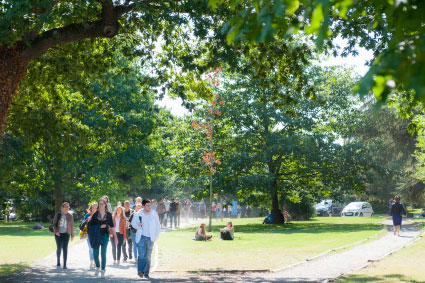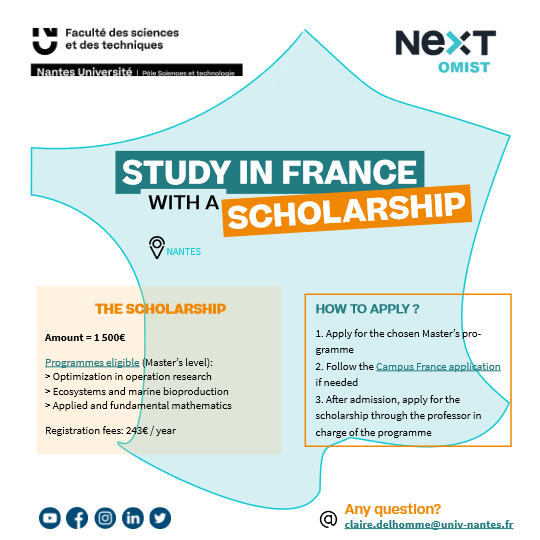Why choose Nantes as your destination for science studies ?
- Internationally recognized ; in 2022, Nantes Université ranked among the top 800 institutions in the Times Higher Education World University Rankings. More information about international indicators and rankings here.
- Internationally competitive in many fields of research. Learn about Research at Nantes Université here.
- Considered as a dynamic and human-sized city, Nantes remains appreciated for its quality of life for students and professionnals. Get to know our campuses !
- Living in Nantes is affordable. Find out more about fees and living expenses for international students with a provisional budget.
- About 5000 students enrolled
- About 300 tenured academic staff
- 9 Bachelor's degrees and 17 Master's degrees (see below for English taught programmes)
LOCATION > the Faculty of Fundamental and Applied Sciences occupies a parkland site on the bank of the Erdre river, only 2km from the centre of Nantes (more information about access to the campus here). Our civil engineering degrees are taught in Saint-Nazaire, about 70km from Nantes on the atlantic coast.
ACADEMIC OFFER > we offer both undergraduate (Bachelor's) and graduate degrees (Master's, Doctorate) in a variety of disciplines in Life Sciences, Physical Sciences, Computer Sciences and Mathematics. More information about our acadamic offer here.
TEACHING > the academic year is organized in two semesters, with the first semester running from September-December, and the second semester running from January-May. In an average undergraduate degree, each semester is comprised of 250h teaching, of which about 10% will be online distance learning. 30 ECTS are awarded for successful completion of each semester.
Instructors are committed to the application of modern teaching methods to make learning more interactive for students - both online and in classes. Development of practical skills is an important part of all our teaching in experimental sciences, and lab classes make up a significant amount of the teaching hours, particularly from the second year onwards.
LANGUAGE OF INSTRUCTION > although some courses include modules that are taught in English, in most undergraduate and graduate courses the language of instruction is French (see below for more information about English taught programmes).
Overseas students can enroll for French language classes that are taught in the evening. These are free for exchange students.
STUDENT SERVICES > access to student services (accomodation, visa validation, healthcare insurance etc.) is handled centrally at the University's welcome desk, the Guichet Unique.
On campus students will find guidance for registration, exams, schedules, and faculty-related matters.
- Bachelor's degree : - Master's degrees :
- MSc in Computer Science - Optimization in Operations Research (ORO)
- Master 2 in Ecosystems and Marine Bioproduction (EBM)
- Master 2 in Applied and Fundamental Mathematics
- Reliability baSed StRuctuRal Maintenance foR MaRine Renewable eneRgy (MaReene) Master's Degree
- Master 2 in AquaCulture, Environment and Society (ACES-STAR)
- Erasmus Mundus Joint Master in Planetary Geosciences : GeoPlaNet
The Faculty of Fundamental and Applied Sciences site hosts research units working in the fields of Life Sciences, Physical Sciences, Computer Sciences and Mathematics. In addition, faculty members also carry out research in laboratories on the Medical School campus, and in laboratories located in other higher education institutions in Nantes.
If you are enrolled in a Master's degree, you will be able to carry out a research project in one of these laboratories. Some Bachelor's degrees also offer the possibility of a research internship in the third year.
Research laboratories at the Faculty of Fundamental and Applied Sciences
- Mathematics : Jean Leray Mathematics Institute
- Earth Sciences / Astrophysics : Laboratory of Planetology and Geosciences
- Chemistry : CEISAM Laboratory / Jean Rouxel Materials Institute
- Physics : Jean Rouxel Materials Institute / Laboratory of Subatomic Physics and Associated Technologies (SUBATECH)
- Engineering : Civil Engineering and Mechanics Research Institute (GeM)
- Computer Science : Nantes Informatics Laboratory (LS2N)
- Life Sciences : Biological Sciences and Biotechnologies Unit (US2B)
- History of Science : François Viète Centre for the History and Epistmelogy of Science and Technology
Research Laboratories on other campuses with at least 5 Science Faculty academic staff
- Life Sciences : ISOMER Institute of Marine Substances and Organisms / Nantes-Angers Cancer Research Centre / Nantes Thorax Institute
To read
- F'AI’R Education Hackathon: AI designed by Nantes students awarded by the British Embassy
- InSight mission: the planet Mars reveals its first secrets
- The Nantes Université collaborates on the first solar drone of the start-up XSun
- Netflix: a "made in Nantes" algorithm for impeccable video quality
- The blob, this cell that tells us more about our genome!
- Nantes: a university course to learn how to dismantle nuclear power plants
- Water on Mars : a discovery that will change our way to see the red planet
- UNESCO: the university engages in teacher training through free educational resources
Contacts
- Admission process for non-exchange students : international.inscription@univ-nantes.fr
- Application process for exchange students : international.accueil@univ-nantes.fr
- International relations at the faculty : relint-sciences@univ-nantes.fr
More information
- Practical information for international students here



